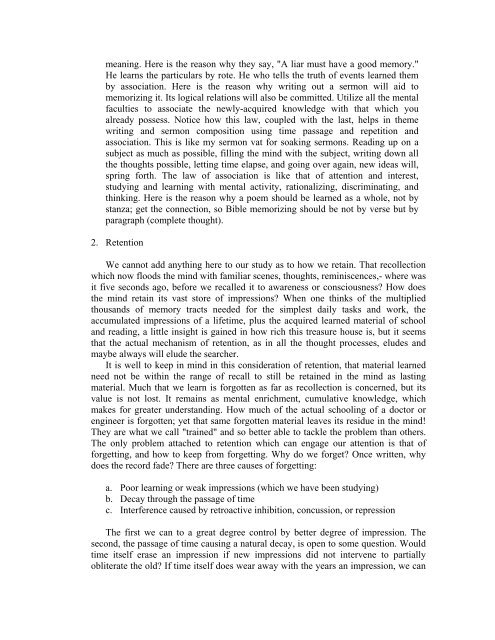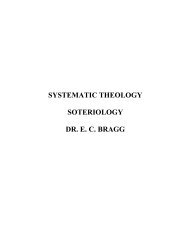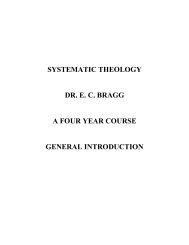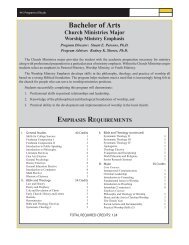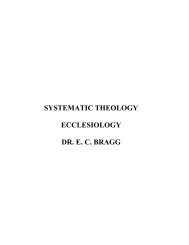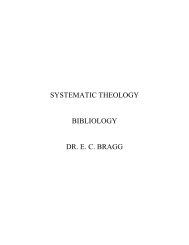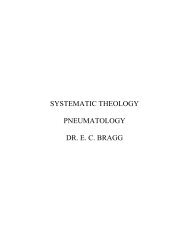CHRISTIAN PSYCHOLOGY DR. E. C. BRAGG - Trinity College
CHRISTIAN PSYCHOLOGY DR. E. C. BRAGG - Trinity College
CHRISTIAN PSYCHOLOGY DR. E. C. BRAGG - Trinity College
Create successful ePaper yourself
Turn your PDF publications into a flip-book with our unique Google optimized e-Paper software.
meaning. Here is the reason why they say, "A liar must have a good memory."<br />
He learns the particulars by rote. He who tells the truth of events learned them<br />
by association. Here is the reason why writing out a sermon will aid to<br />
memorizing it. Its logical relations will also be committed. Utilize all the mental<br />
faculties to associate the newly-acquired knowledge with that which you<br />
already possess. Notice how this law, coupled with the last, helps in theme<br />
writing and sermon composition using time passage and repetition and<br />
association. This is like my sermon vat for soaking sermons. Reading up on a<br />
subject as much as possible, filling the mind with the subject, writing down all<br />
the thoughts possible, letting time elapse, and going over again, new ideas will,<br />
spring forth. The law of association is like that of attention and interest,<br />
studying and learning with mental activity, rationalizing, discriminating, and<br />
thinking. Here is the reason why a poem should be learned as a whole, not by<br />
stanza; get the connection, so Bible memorizing should be not by verse but by<br />
paragraph (complete thought).<br />
2. Retention<br />
We cannot add anything here to our study as to how we retain. That recollection<br />
which now floods the mind with familiar scenes, thoughts, reminiscences,- where was<br />
it five seconds ago, before we recalled it to awareness or consciousness? How does<br />
the mind retain its vast store of impressions? When one thinks of the multiplied<br />
thousands of memory tracts needed for the simplest daily tasks and work, the<br />
accumulated impressions of a lifetime, plus the acquired learned material of school<br />
and reading, a little insight is gained in how rich this treasure house is, but it seems<br />
that the actual mechanism of retention, as in all the thought processes, eludes and<br />
maybe always will elude the searcher.<br />
It is well to keep in mind in this consideration of retention, that material learned<br />
need not be within the range of recall to still be retained in the mind as lasting<br />
material. Much that we learn is forgotten as far as recollection is concerned, but its<br />
value is not lost. It remains as mental enrichment, cumulative knowledge, which<br />
makes for greater understanding. How much of the actual schooling of a doctor or<br />
engineer is forgotten; yet that same forgotten material leaves its residue in the mind!<br />
They are what we call "trained" and so better able to tackle the problem than others.<br />
The only problem attached to retention which can engage our attention is that of<br />
forgetting, and how to keep from forgetting. Why do we forget? Once written, why<br />
does the record fade? There are three causes of forgetting:<br />
a. Poor learning or weak impressions (which we have been studying)<br />
b. Decay through the passage of time<br />
c. Interference caused by retroactive inhibition, concussion, or repression<br />
The first we can to a great degree control by better degree of impression. The<br />
second, the passage of time causing a natural decay, is open to some question. Would<br />
time itself erase an impression if new impressions did not intervene to partially<br />
obliterate the old? If time itself does wear away with the years an impression, we can


